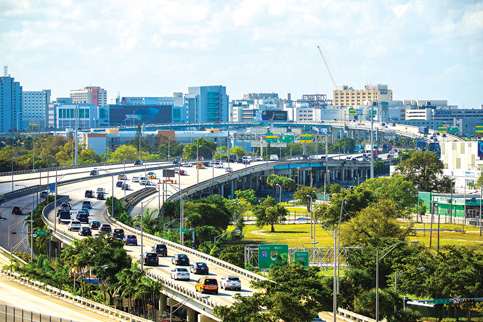
The battle for control of five tolled Miami-Dade expressways has so impeded their future operations that a major national bond-rating agency last week downgraded $1.3 billion in expressway bonds and issued a negative outlook ahead of a March court date that could partially sort out the mess.
The battle is over the locally controlled Miami-Dade Expressway Authority, which state legislation last year attempted to shut down and replace with a state-controlled entity branded the Greater Miami Expressway Agency.
The rating, said Fitch Ratings, “takes into account the acute level of political interference into the authority’s governance and rate-setting, along with the potential for a weakened pricing framework” because of the state legislation, “which places a prolonged moratorium on rate increases.”
The impact of Fitch’s reduction of ratings on the expressway authority’s outstanding bonds from A- to BBB+, coupled with a new negative rating outlook from Fitch, is that borrowing money for future expressways construction would be more costly because interest rates would almost certainly rise.
In the construction pipeline should courts ultimately allow the Miami-Dade Expressway Authority to continue to exist is, most notably, a planned $1 billion southeastern Kendall Parkway extension of the East-West or Dolphin Expressway as the proposed solution to the east-west corridor transit bottleneck. That makes the roadway central to the county’s future transportation plans.
Fitch issued its report ahead of scheduled March 10 arguments before the 1st District Court of Appeal in the constitutional battle about the new law that seeks to make major changes in the governance of five tolled Miami-Dade expressways and the powers of whoever will oversee and operate those tollways.
The law, which passed in the last session of the Florida Legislature in spring 2019, would abolish the expressway authority. Gov. Ron DeSantis quickly appointed three new members of the planned nine-member agency that would replace the expressway authority, but the old authority quickly filed a multi-count lawsuit challenging the new law.
Leon County Judge John Cooper then ruled in August that the new law was unconstitutional because it violated Miami-Dade’s home-rule powers.
The state has argued in appeal that the lawsuit should be dismissed, saying the Miami-Dade County Expressway Authority didn’t have the power to challenge or continue the case because the new law had dissolved it.
Judge Cooper ruled that the measure is a “local law” that violates the county’s constitutionally protected powers.
Florida House attorneys said that because the expressway system has broad economic impact and handles large numbers of drivers from across the state, the law is not merely a local law but of statewide impact.
Fitch said that its bonds downgrade to BBB+ “reflects the continued legal uncertainty surrounding the authority’s governance structure and the ambiguity in regards to strategic direction and oversight during the course of the potentially lengthy legal proceedings. The lack of clarity regarding the legal outcome and management of the expressway authority has resulted in it operating without a board of directors, thereby limiting the full functionality of operations and limiting its capital planning and investment strategy.”
Despite the impact of the March 10 hearing, Fitch wrote that it expects continued legal proceedings that may be prolonged. “There is also the possibility that the outcome of the March hearing may leave the authority without a board through fiscal year-end and thereby unable to execute or enter into contracts,” the ratings firm said.
If legal proceedings affect the authority’s liquidity or maintenance of assets, Fitch forecast, “additional rating pressure may occur” on the authority’s bonds.
Fitch said the authority had adequate liquidity, with $253 million or 526 days of cash on hand, but cited “uncertainty around the authority’s capital planning and investment strategy.”
The bill geared to dissolve the expressway authority strips away toll rate-setting autonomy through a required rate reduction and bans toll rate increases for at least five years, unless they are needed to comply with bond covenants, Fitch noted.
But, the company noted with concern, even if the bill does not ultimately take effect and the expressway authority remains in its current form, “Fitch expects rate-making flexibility to be hindered given the unprecedented level of political interference to date.”
An issued writ that will be the subject of the March 10 hearing places the expressway board in limbo, Fitch says, “making the expressway unable to move forward with new funding, contracts or projects. Additionally, the bill requires debt-financed capital projects to receive approval from the Florida Legislative Budget Commission, which could politicize capital planning.
“Further, there are concerns that funding for the authority’s capital plan could be significantly impaired if tolls were to fall as prescribed by the bill, which could lead to greater dependence on future borrowings or a weakening of the currently strong asset maintenance regime.”
The March hearing will not address the constitutionality of the 2019 legislation that would abolish the expressway authority. During the transitional period, the authority’s management remains in charge, but the authority has no functioning board. Management has suggested they are unable to make changes to contracts, make procurements, or issue debt, among other limitations, Fitch noted.
Fitch said these limitations haven’t done major harm so far but “they will pose a more substantial challenge should the legal stay remain in place through the end of fiscal 2020, when the asset maintenance and roadside assistance contracts are scheduled to expire. Extension of existing contracts or procurement of new contracts would necessitate board action.”
Traffic growth on the five expressways in fiscal 2019 was moderate, increasing by 2.7% to 503.7 million transactions, Fitch notes. However, toll revenues declined by $36.4 million or 15.1% to $203.7 million.
The expressway authority, formed in 1994, has been responsible for operating, maintaining and improving the Airport Expressway (SR-112), the East-West (Dolphin) Expressway (SR-836), the South Dade (Don Shula) Expressway (SR-874), the Gratigny Parkway (SR-924), and the Snapper Creek Expressway (SR-878).
https://www.miamitodaynews.com/2020/02/25/embattled-miami-dade-expressway-authority-bond-ratings-fall/


